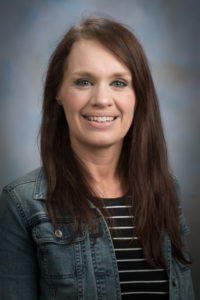Editor’s note: The Provost’s Council for Engagement is made up of a dozen Colorado State University faculty members representing all eight colleges and Morgan Library. Council members serve as champions for advancing the practice and recognition of engaged scholarship as fully embedded within CSU’s core teaching, research and service missions.
We are profiling the members of the council, who will in their own words help showcase the diversity of engaged scholarship across campus, as well as the impact of this work on communities and the university. So far, nine of the council members – Martin Carcasson, Christine Fruhauf, Neil Grigg, Bill Shuster, Robin Reid, Frank Garry, Tracy Nelson, Patty Rettig, Meena Balgopal and Wade Troxell – have been profiled.

Part of Jennifer Martin’s engaged scholarship involves teaching a global agriculture program for high school students. Photo courtesy Jennifer Martin
This month we meet Jennifer Martin, assistant professor in the Center for Meat Safety and Quality in the Department of Animal Sciences, College of Agricultural Sciences.
Martin’s research interests lie in a systems-based approach to meat safety and quality. She intends to explore the complex, interwoven, and ever-evolving pathways that influence the production of safe, sustainable, and high-quality meat. Additionally, as a passionate educator, Jennifer plans to serve the department and its students by leading and teaching with not only a purpose, but also a passion.
What, in your opinion, is ‘faculty engagement’?
In my opinion, faculty engagement is critical to the land-grant mission and relies on the reciprocal exchange of ideas, thoughts, and opinions with the communities of which we are a part (social, educational, professional, physical, etc.) and the industries which we serve. It goes beyond outreach – or the sharing of knowledge with our external partners – and includes co-creation of new knowledge or ideas. It can take many different forms and can be found in all areas of a faculty member’s appointment.
In an agricultural field, faculty engagement is a fundamental component of who we are. The grand challenges of agriculture cannot be solved from the confines of a lab or classroom – instead, these grand challenges demand that we engage with the larger community to develop sustainable and practical solutions. As a young faculty member, the opportunity to engage with my community and industry is incredibly exciting. It means that being a part of impactful and long-term change allows me to bring engaged scholarship to my teaching and research. So, not only am I able to work with external/internal partners to develop solutions for the grand challenges, but the students in my classroom can also experience how solutions are developed for real-world problems – “with” them, not “for” them.
How have you, your program or students benefitted from what you have learned as an engaged faculty member? And, has there been any sort of reciprocity – or two-way learning – with the communities outside of CSU that you have been involved with?

In an agricultural field, engagement is necessary for my success as a teacher and researcher. The relationships we’ve developed with external partners has enhanced not only our scientific capacity, but also resulted in solutions for real-world challenges. While we’ve helped develop some of these solutions, the new information that is co-created often results in new ideas of research questions. From a student perspective, exposing students to the industry in which we work is one of the best advantages of engaged scholarship and teaching. Rather than students hearing my own interpretation of the industry’s challenges, they’re able to experience them firsthand. Furthermore, through some of our research projects, the students are able to take part in developing solutions.
Why are you involved with this council and how does it relate to your work or research?
As a junior faculty member, being a part of this council is incredibly important to me. Often times (and this is not limited to CSU), junior faculty members feel discouraged from participating in engaged scholarship for a variety of reasons, or intimidated by the time and work required to form the necessary relationships. Many of these reasons can be overcome with enhanced resources and an infrastructure that supports faculty who choose to perform engaged scholarship. As a young faculty member with (hopefully!) a full career ahead of them, it’s important to me that I’m a part of helping develop these resources.
What do you hope the council is able to accomplish?
I’m hopeful that the council is able to help create a culture that recognizes the value of engaged scholarship in its many forms. Thus far, the council has made great strides in developing metrics for measuring and rewarding engaged scholarship. Moving forward, I hope that we continue this momentum and continue to elevate engaged scholarship at CSU.
Any other thoughts on the Provost’s Council on Engagement?
As a land-grant institution, engagement with our community is such a core component of who we are and what we do. In my time on the council, I’ve been so privileged to not only learn from my fantastic colleagues, but also develop an appreciation for the great work CSU is doing to not only elevate our University, but also impact our local, state, national, and global communities. It’s easy to get bogged down by the day-to-day, but if you take a look around, it’s also easy to see that we are making an impact on each other, on our students, in our community, and around our world.